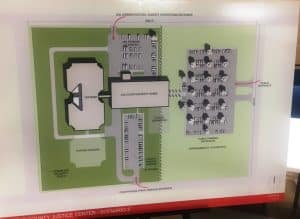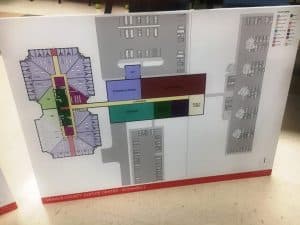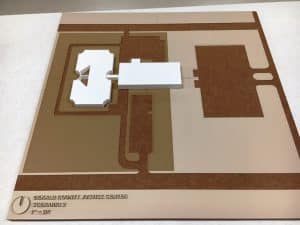News
Trio Found with Meth During Traffic Stop
April 30, 2024
By: Dwayne Page
A trio found with methamphetamine during a traffic stop last Tuesday, April 23 will be making an appearance in court next week on the charges.
48-year-old Stephanie Ann Pierce of Blue Springs Road, Sparta, 23-year-old Hunter Ray Murphy of Green Hill Road, Smithville, and 59-year-old David Lloyd Close of Holmes Creek’s Road, Smithville are each charged with possession of methamphetamine with intent to manufacture, sell or deliver. Murphy and Close are also charged with possession of drug paraphernalia. Bond for Pierce is $20,000. Murphy and Close are each under a $22,500 bond. All will appear in General Sessions Court May 9.
Sheriff Patrick Ray said that on Tuesday, April 23 a deputy pulled over a gray Nissan Altima on Midway Road at the intersection of Dunn Lane after noticing the vehicle’s driver side taillight was out. The officer spoke to the driver, Pierce who volunteered that her vehicle had no valid insurance. Both Murphy and Close were in the automobile with Pierce. Close was seated on the front passenger side and Murphy was in the back seat on the driver side. All three gave consent for the deputy to search them but Pierce didn’t want the officer to search her vehicle. The search of Close yielded a gray metal cylinder which had a crystal-like substance believed to be methamphetamine. After discovery of the cylinder, which was in Close’s pants pocket, the deputy conducted a full vehicle search and found a green L & D cigarette pack in the rear seat which held 0.94 grams of a crystal-like substance believed to be methamphetamine. A further search of the vehicle produced drug paraphernalia from a black bag in the rear seat floorboard with Murphy’s wallet and driver license in it. A black digital scale with a white powdery substance believed to be meth was also recovered. After all three denied that the substances found belonged to them they were placed under arrest.
Local Observance Scheduled for National Day of Prayer May 2
April 30, 2024
By: Dwayne Page
This year, the National Day of Prayer celebrates 73 years of prayer for America! This observance acknowledges the blessings of living in a country where, by law, every year on the first Thursday of May, the President proclaims a day of prayer for the nation.
The National Day of Prayer observance was created in 1952 by a joint resolution of Congress and signed into law by President Harry Truman. Each year since then the president has called upon the citizens of the nation to pray, and in 1988 President Ronald Reagan established this day of prayer to be the First Thursday of May. The significance is that it enables everyone nationwide to recall and to teach the way in which the founders sought the wisdom of God when faced with critical challenges and decisions. It stands as a call for everyone to humbly come before God, seeking His guidance for the nation’s leaders and His grace upon us as a people.
Local pastors and churches would like to invite you to join with them, others from your community, and people from across our nation, as they plead for God’s mercy and guidance in our country. Smithville will have a gathering on May 2, 6:00pm at Northside Elementary School gymnasium. They hope to see you there as we seek God together!
Jail Committee Advances Plan for Judicial Center (View Videos Here)
April 29, 2024
By: Dwayne Page
Another Step Closer!
Almost six months after voting to recommend to the full county commission that a new judicial center be built rather than a new jail, the county jail committee (which is comprised of the entire county commission) has settled on what type of facility should be constructed based on funding by the county. The estimated cost is $63,817,500 (not counting purchase price for property and cost of possibly up to three times more the amount of staffing) and could require as much as a 65 cent property tax increase or a combination 47 cent property tax hike coupled with a $50 wheel tax, subject to a study and recommendation to the county commission by the budget committee which is in the midst of planning now for the 2024-25 fiscal year.
(Rick Bruining of Bell Construction in video below addressed County Jail Committee Monday night on the pros and cons of three scenario schematic designs of proposed new judicial center (Part 1)
After reviewing three different 190 jail bed schematic site plan scenarios as presented in February by the county’s architect and construction manager, Treanor Architects and Bell Construction, the jail committee Monday night voted 11-0 to recommend that the county commission move forward with the project under the so called “Scenario 2” plan which as presented would be a 102,000 square foot, two level structure, to be situated on up to a 15 acre site (enough for future expansion) not yet purchased or selected. The proposed facility would include inmate housing for up to 190 prisoners on the ground floor with a mezzanine level while the sheriff’s department and courtrooms would be on the second floor.
(Rick Bruining of Bell Construction in video below addressed County Jail Committee Monday night on the pros and cons of three scenario schematic designs of proposed new judicial center (Part 2)
Although this scenario is costly, John Eisenlau of Treanor Architects and Rick Bruining of Bell Construction said it is less expensive than the other two options being considered which included building the entire judicial center on one level or trying to fit it on the existing site downtown with up to four levels. However, under each scenario, Jim Hart, Jail Consultant and Field Manager of the County Technical Assistance Service (CTAS) recommended that the number of staff for the jail operation (correctional officers, etc.) be increased from the current level of 17 to as many as 58 once the new facility is constructed and operational.
(John Eisenlau of Treanor Architects in video below addressed County Jail Committee Monday night on the pros and cons of three scenario schematic designs of proposed new judicial center)
“The option the jail committee selected (Scenario 2) is almost $1.5 million less expensive than the more spread-out single story (scenario 1 plan) and it is about $5.5 million cheaper than building on the existing location (scenario 3),” said Bruining.
(Jim Hart, Jail Consultant and Field Manager of the County Technical Assistance Service (CTAS) recommended that the number of staff for the jail operation (correctional officers, etc.) be increased from the current level of 17 to as many as 58 once the new Judicial Center is constructed and operational)
“Scenario 2 is a 190-bed detention facility that has courts and the sheriff’s operations associated with it,” said Eisenlau. “The total square footage of the building is roughly 102,000 square feet. Under this scenario, the (inmate) housing sits in back of the property (first level), not seen by the public. The jail would be on the first level in front of the building for the intake, medical, kitchen, laundry all those things you want on the ground. The second level could have the courts and the sheriff’s operations. That way the sheriff’s department is moving everybody (prisoners) on one level and the only time they go up is when they go to court. We as the architectural team and the build team recommend the two-story solution. It offers some operational, construction, and energy related efficiencies for the facility with it being more compact. It turns out to be the most cost-effective solution which is normally the case with a multi-story versus single story building and its planned for a 15-acre site which makes it expandable on all levels. The jail, courts, and housing can all be expanded in the scenario we have developed. The committee did a terrific job in evaluating the three options,” said Eisenlau.
In addition to it being much more costly, Bruining said building a new facility on the existing site downtown poses other challenges.
“Construction time 18-20 months longer and there is no way to expand it in the future. Sufficient parking would be a struggle and the topography is such that we would have to put retaining walls in and build up the site. Utilities would probably have to be relocated two times during the course of the project and by building next to a facility (sheriff’s department) already in operation, we would have to ensure that the sheriff’s office could maintain its operational duties. That would be difficult to do when you are building right next to it not to mention the fact that on other sides of the property there is the public square, a creek, and someone else’s property,” said Bruining.
If and when funding is approved, Eisenlau said it could take 10 months for the architects to design the project and, according to Bruining, construction might be completed within 27 months after the project is let for bids.
Jail committee members Monday night voting for the judicial center scenario 2 option were Beth Pafford, Mathias Anderson, Jeff Barnes, Andy Pack, Larry Green, Glynn Merriman, Greg Matthews, Tony (Cully) Culwell, Tony Luna, Sabrina Farler, and Daniel Cripps. Members absent were Tom Chandler, Myron Rhody, and Susannah Cripps.
After the vote, members of the jail committee discussed options on what land should be considered for purchase.
In February, County Mayor Matt Adcock announced that he had been in contact with landowner, Jerry Dwayne Foster who has 57.59 acres near Allen’s Ferry Road behind Bizee Mart that he is willing to sell to the county at a price of $1.3 million. The property is currently not in the city limits but could possibly be annexed.
Jail committee member Greg Matthews made a motion to recommend that the county purchase the Foster property subject to Foster asking the city to annex it and zone it commercial. Member Glynn Merriman offered a second to Matthews’ motion but it failed 8 to 3 with Mathias Anderson being the only member voting with Matthews and Merriman.
Member Tony Luna suggested that any action on the purchase of land be postponed until all members of the jail committee jointly make an onsite visit and inspection of the Foster property and other sites that are available for sale and might be suitable for a judicial center. Other members of the committee agreed and they have set May 7 as the date for those onsite visits.
« First ‹ Previous 1 177 267 275 276 277278 279 287 377 2570 Next › Last »














